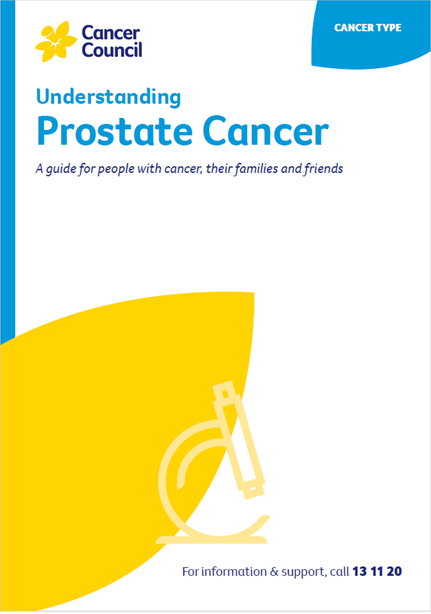- Home
- Prostate cancer
- Managing side effects
- Other side effects
Other side effects
Treatment for prostate cancer may lead to a range of other concerns, but most of these can be managed.
Learn more about:
- Fatigue
- Bowel problems
- Hot flushes
- Osteoporosis
- Heart problems
- Loss of muscle mass and strength
- Hormone effects
- How exercise and diet can help
Fatigue
Cancer treatment often makes people very tired. After surgery, it may take some time to get back your strength. With external beam radiation therapy, you may get particularly tired near the end of treatment and for some weeks or months afterwards. Regular exercise can help reduce tiredness.
For more on this, see our general section on Fatigue or listen to our podcast below.
Bowel problems
Although this is an uncommon side effect of radiation therapy, you may experience rectal bleeding after treatment. It is common to have a stronger sensation of needing to have a bowel movement. A gastroenterologist or colorectal surgeon may treat ongoing bowel problems with changes to your diet, steroid suppositories (a tablet that you insert into the rectum through the anus), laser therapy or other treatments applied to the bowel wall. For more information, talk to your radiation oncologist or a continence nurse.
Hot flushes
You may experience hot flushes if you are having ADT. Things that may help include drinking less alcohol, avoiding hot drinks, wearing loose-fitting cotton clothing, getting regular exercise, learning relaxation techniques, and trying acupuncture. For more information, talk to your doctor.
Osteoporosis
Loss of bone density can be a delayed side effect of ADT, so your specialist or GP may need to monitor your bone mineral density.
Regular weight-bearing exercise (e.g. brisk walking, light weights or a guided exercise program), eating calcium-rich foods (e.g. yoghurt, milk, tofu, green vegetables), getting enough vitamin D, limiting how much alcohol you drink, and not smoking will also help keep your bones strong.
For more information, contact Healthy Bones Australia on 1800 242 141.
Heart problems
Because ADT can increase the risk of heart problems and stroke, your doctor will monitor how well your heart is working.
Loss of muscle mass and strength
You may find a decrease in muscle mass the longer you are on ADT. So staying as fit and active as you can may help. Clinical trials are looking at how strength and resistance training (used with supplements) may preserve muscle mass for people with prostate cancer.
Hormone effects
Weight gain, mood swings, breast swelling, body changes, and high cholesterol are more likely to happen the longer you use ADT.
How exercise and diet can help
Regular exercise can help manage the side effects of ADT. It improves mood, heart health, bone and muscle strength, and energy levels.
Whatever your age or fitness level, a physiotherapist or exercise physiologist can develop an exercise program to meet your specific needs. Ask your doctor for a referral. Exercise after a cancer diagnosis includes examples of different cardio and aerobic exercise, strength and resistance training and flexibility exercises.
ADT can lead to weight gain and increase the risk of high cholesterol. Aim to eat a balanced diet with a variety of fruit, vegetables, wholegrains and protein-rich foods. It may help to see a dietitian.
For more on this, see Living well after cancer and watch our videos on Exercise and Cancer and Nutrition and Cancer below.
→ READ MORE: Life after treatment
Podcast: Managing Cancer Fatigue
Listen to more of our podcast for people affected by cancer
Video: Exercise and Cancer
Video: Nutrition and Cancer
More resources
Prof Declan Murphy, Consultant Urologist, Director – Genitourinary Oncology, Peter MacCallum Cancer Centre and The University of Melbourne, VIC; Alan Barlee, Consumer; Dr Patrick Bowden, Radiation Oncologist, Epworth Hospital, Richmond, VIC; Bob Carnaby, Consumer; Dr Megan Crumbaker, Medical Oncologist, St Vincent’s Hospital Sydney, NSW; Henry McGregor, Health Physiotherapist, Adelaide Men’s Health Physio, SA; Jessica Medd, Senior Clinical Psychologist, Department of Urology, Concord Repatriation General Hospital and Headway Health, NSW; Dr Gary Morrison, Shine a Light (LGBTQIA+ Cancer Support Group); Caitriona Nienaber, 13 11 20 Consultant, Cancer Council WA; Graham Rees, Consumer; Kerry Santoro, Prostate Cancer Specialist Nurse Consultant, Southern Adelaide Local Health Network, SA; Prof Phillip Stricker, Chairman, Department of Urology, St Vincent’s Private Hospital, NSW; Dr Sylvia van Dyk, Brachytherapy Lead, Peter MacCallum Cancer Centre, VIC.
View the Cancer Council NSW editorial policy.
View all publications or call 13 11 20 for free printed copies.

